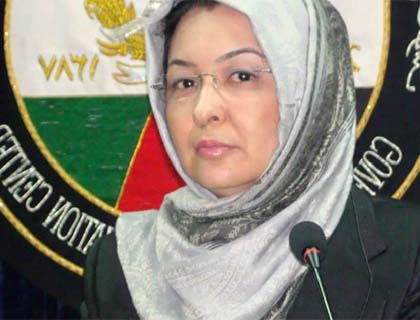KABUL - A senior delegation from Pakistan met Wednesday with a team from Afghanistan, the Minister of Public Health, Suraya Dalil, and partners of the Polio Eradication Initiative, to reconfirm and strengthen the commitment of both countries to work closely together to eradicate polio from the region.
At the World Health Assembly in May 2012, polio eradication was declared a programmatic emergency for global public health, highlighting the urgent need to tackle the problem in the three countries in which polio remains endemic; in Afghanistan, Pakistan and Nigeria. In response, Afghanistan and Pakistan have prepared National Emergency Action Plans (NEAP) to stop the transmission of the polio virus involving multiple sectors, through more aggressive, focused and measureable approaches.
"To achieve the full eradication of polio requires shifting the issue from a position of priority where it is now, into full emergency mode," said the Minister of Public Health, Suraya Dalil. "To this end, the Ministry of Public Health has scaled up its concerted efforts and increased engagement with communities, so as to ensure that all children in Afghanistan are fully immunized against this disease of permanent disability."
Meanwhile, Ms. Shahnaz Wazir Ali, Advisor to the MP on social sectors talked on the issue, terming this meeting so important towards the joint struggle against the eradication of polio in the region.
She added that its next meeting between Afghanistan and Pakistan will be held in Islamabad at purpose of further extension over jointly combating in eradicating of polio in the region and want to extend our cooperation regarding the polio eradication with Afghan government.
In Afghanistan, The Ministry of Public Health (MoPH), along with WHO, UNICEF and others partners, regularly conducts national and sub-national level immunization campaigns to stop the circulation of the polio virus in the country. Almost 55,000 service providers including coordinators, supervisors, monitors, community mobilizers and volunteers are involved in each National Immunization Day (NID). During each National Immunization Day, almost eight million children under five years are vaccinated against polio through a house-to-house approach. An additional 3 million children are vaccinated in sub-NIDs. Almost one million children are vaccinated every year by the Afghanistan cross border teams.
"As a long-term partner in the Polio Eradication Initiative, WHO believes that we can win this race to declare both Afghanistan and Pakistan polio-free," said WHO Regional director for the Eastern Mediterranean Regional Office, Dr. Ala Alwan. "The successes we have seen in the neighboring countries, most recently in India, show us that the goal is achievable and that we must make the best use of opportunities and resources to achieve this critical goal."
Afghanistan and Pakistan are considered as one epidemiological block because they share a long and porous border with both formal and informal crossing points and large cross-border population movements. Halting the circulation of the polio virus in these countries requires close coordination and synchronization, particularly in the border areas on both sides. As of July 15, a total of 13 confirmed polio cases have been reported in Afghanistan in 2012. In Pakistan, 25 confirmed cases have been reported. Most of these cases have occurred in neighboring provinces across the border between these two countries.
"We urgently need to focus our efforts, on both sides of the border, on reducing the number of children who are missed during polio rounds," said, UNICEF Afghanistan Representative, Peter Crowley. "To eradicate this disease once and for all will take a stronger, more coordinated effort than ever before. We must increase community demand and involvement, raise the quality of immunization campaigns, and ensure that we reach every child, every time."
Notes for editors:
The benefits of eradicating Polio are well known: once achieved, polio eradication would generate net benefits of US$40-50 billion globally by 2035, with the bulk of savings in the poorest and most fragile countries.
The Global Polio Eradication Initiative (GPEI) is spearheaded by national governments, the World Health Organization (WHO), Rotary International, the US Centers for Disease Control and Prevention(CDC) and UNICEF, and supported by key partners including the Bill &Melinda Gates Foundation.
Since 1988 (the year the GPEI was launched),the incidence of polio has been reduced by more than 99 per cent. In 1988, more than 350,000 children were paralyzed each year in more than 125 endemic countries. In 2012, 55 cases have been reported (as of 15 May 2012), and only three countries remain endemic: Nigeria, Pakistan and Afghanistan.
Ministry of Public Health delivers health services impartially and without any form of discrimination to the needy people of Afghanistan in all corners of the country and requests all parties to respect this policy and support health care providers to fulfill this noble job. (PR)

